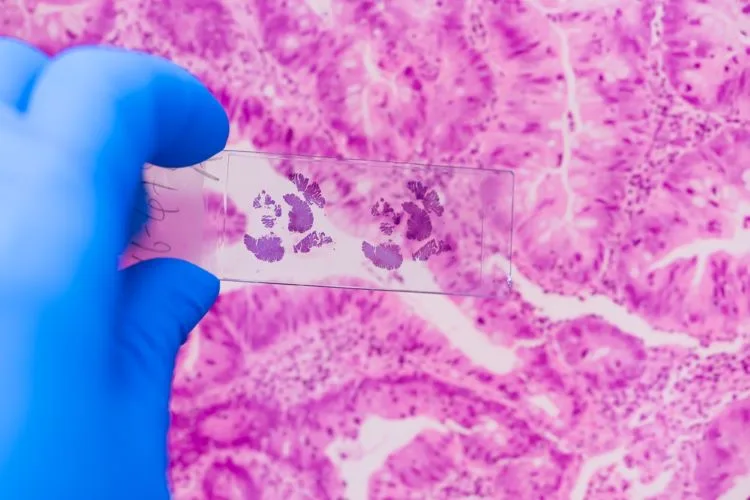A novel immunotherapy for breast cancer is showing significant early results in clinical trials, offering new hope for patients with advanced forms of the disease. This cutting-edge treatment could mark a major advancement in the fight against breast cancer, providing a much-needed alternative to traditional therapies.
Immunotherapy, a treatment that harnesses the body’s immune system to fight cancer, has already shown success in other cancers. Now, researchers are excited by early-stage findings that suggest this approach could be a breakthrough for breast cancer as well, especially for those battling triple-negative breast cancer (TNBC), one of the most aggressive and difficult-to-treat subtypes of the disease.
How Does This New Immunotherapy Work?
This novel breast cancer immunotherapy is designed to target specific proteins on cancer cells that help the immune system recognize and attack them. By stimulating the immune system to focus on and destroy cancer cells more effectively, the therapy enhances the body’s natural defenses.
Unlike traditional treatments, such as chemotherapy or radiation, which target both cancerous and healthy cells, immunotherapy is more targeted, potentially reducing side effects and offering patients a better quality of life during treatment.
The drug being studied in these clinical trials is showing promise, with early results suggesting that it could lead to significant improvements in progression-free survival for patients, particularly those with advanced forms of breast cancer that have not responded well to other treatments.
Early Clinical Trial Results
The early data from clinical trials of this breast cancer immunotherapy is generating excitement within the medical community. Patients who received the immunotherapy showed a notable improvement in tumor response rates, especially in cases of triple-negative breast cancer (TNBC) and HER2-positive breast cancer.
While more data is needed to determine the long-term efficacy and safety of this new treatment, these initial results have opened the door to a potential new way of treating breast cancer—one that could offer a more personalized and targeted approach to therapy.
The Promise of Immunotherapy for Breast Cancer
For years, breast cancer treatment options have been limited to surgery, chemotherapy, radiation, and hormonal therapies. While these treatments have been effective for many, they do not work for all patients, particularly those with more aggressive forms of cancer.
Immunotherapy represents a promising new frontier in cancer treatment. Unlike traditional therapies that focus on destroying the cancer directly, immunotherapies work by boosting the immune system’s ability to recognize and attack cancer cells, leading to potentially longer-lasting results.
This new class of cancer drugs is particularly exciting for patients with metastatic or advanced-stage cancers, where the cancer has spread beyond its original location. Immunotherapy has the potential to help these patients live longer and experience better outcomes, even when other treatments have failed.
Impact on Triple-Negative Breast Cancer
One of the most promising aspects of this new immunotherapy is its potential for triple-negative breast cancer (TNBC), a form of the disease that is particularly difficult to treat. TNBC lacks the three most common receptors that drive breast cancer growth (estrogen, progesterone, and HER2), which makes it less responsive to hormone therapies and targeted treatments.
Immunotherapy is showing early success in triple-negative breast cancer patients, offering a potential new option for those who have limited choices. The results of these trials could help change the standard of care for TNBC, providing better outcomes for women diagnosed with this aggressive cancer type.
What’s Next for Breast Cancer Immunotherapy?
While the early results are promising, more research and clinical trials will be needed to fully understand the long-term effects and best uses of this new immunotherapy. Future trials will focus on refining the treatment, determining the best patient populations, and testing its combination with other therapies to maximize efficacy.
Moreover, as with all new treatments, further testing will assess any potential side effects and long-term safety concerns. Researchers are hopeful that with continued advancements, this immunotherapy could become a standard part of breast cancer treatment, offering patients a more effective, less toxic option for managing their condition.
Conclusion: A New Hope for Breast Cancer Patients
The promising early-stage results from clinical trials of this novel breast cancer immunotherapy are offering new hope to patients battling one of the most common and aggressive forms of cancer. With its ability to target cancer cells more precisely, this therapy represents a potential breakthrough for those with advanced breast cancer, especially those with triple-negative breast cancer.
As research progresses, this immunotherapy may become an essential tool in the fight against breast cancer, providing patients with better options and ultimately improving their survival rates. With continued clinical trials, we may soon see immunotherapy as a key part of the treatment landscape, offering new hope for millions of women affected by this disease.
BreastCancerImmunotherapy, #CancerTreatment, #BreastCancerResearch, #CancerBreakthrough, #Immunotherapy, #BreastCancerAwareness, #CancerResearch, #CancerInnovations, #ImmunotherapyTrials, #NewCancerTreatment




+ There are no comments
Add yours